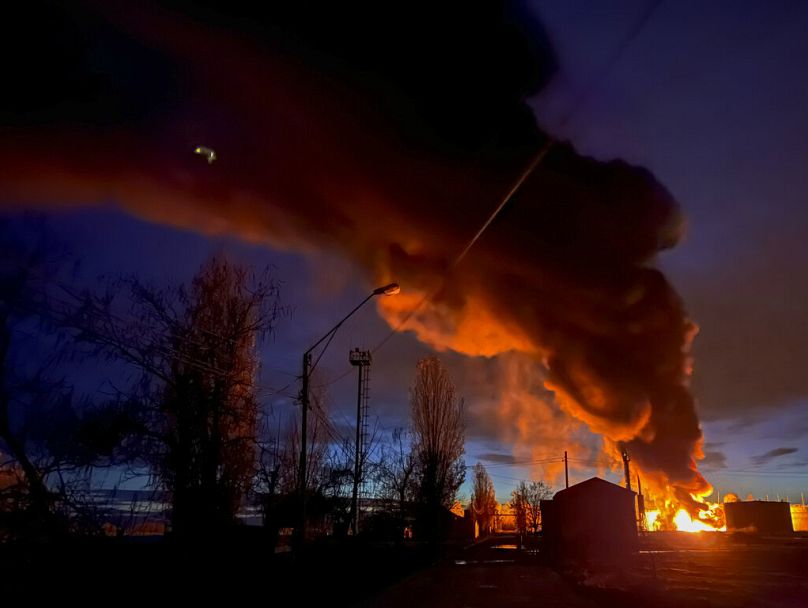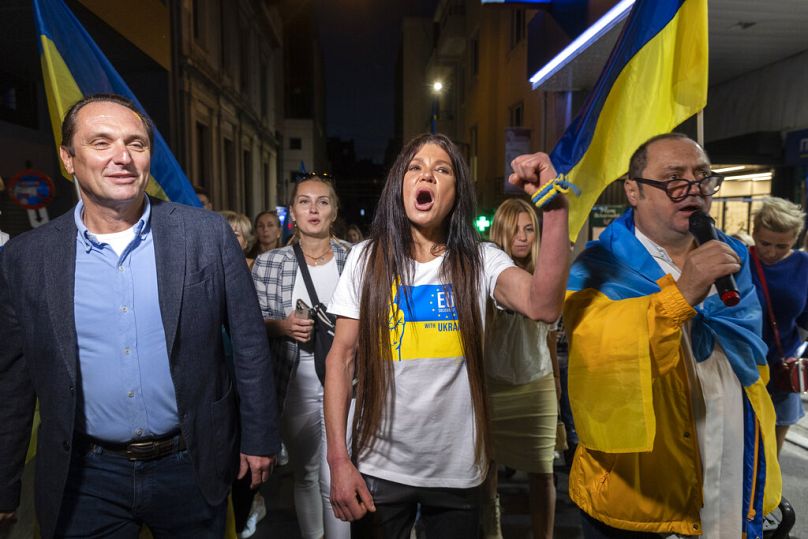Here is our round-up of the latest news from Russia's war in Ukraine.
1. German offers Patriot missile defence system to Poland
Germany has offered Warsaw the Patriot missile defence system to help it to secure its airspace, after a stray missile crashed in Poland last week, Defence Minister Christine Lambrecht told a newspaper on Sunday.
The German government had already said it would offer its neighbour further help in air policing with German Eurofighters after the incident, which initially raised fears that the war in Ukraine could spill across the border.
"We have offered Poland support in securing airspace -- with our Eurofighters and with Patriot air defence systems," Lambrecht told the Rheinische Post and General Anzeiger.
The missile that hit Poland last week, killing two people, appeared to have been fired by Ukraine's air defences rather than a Russian strike, NATO chief Jens Stoltenberg has said.
Ground-based air defence systems such as Raytheon's Patriot are built to intercept incoming missiles.
NATO has moved to strengthen air defences in eastern Europe since Russia's invasion of Ukraine in February. More than a dozen NATO allies led by Germany in October kicked off an initiative to jointly procure air defence systems for several layers of threats, including Patriot.
Germany had 36 Patriot units when it was NATO's frontline state during the Cold War. German forces currently have 12 Patriot units, two of which are deployed to Slovakia.
2. Ukraine to investigate allegations its troops killed surrendering Russian forces
Ukraine says it will investigate video footage circulated on Russian social media which Moscow alleged shows that Ukrainian forces killed Russian troops who may have been trying to surrender, after one of the men seemingly refused to lay down his weapon and opened fire.
“Of course, Ukrainian authorities will investigate this video," Olha Stefanishyna, Ukraine's deputy prime minister overseeing the country’s push to join the European Union, said on the sidelines of a security forum in Halifax, Canada.
Stefanishyna said “it is very unlikely” that the short, edited snippets show what Moscow claims.
Russian authorities announced the opening Friday of a criminal investigation based on the snippets posted on Russian Telegram channels and relayed on other social media. They present a muddled and incomplete picture.
Russian Foreign Ministry spokeswoman Maria Zakharova claimed the footage shows an “execution" and said Russia wants an international investigation.
Stefanishyna, however, said Ukrainian forces are “absolutely not interested in the execution of anybody" and are under direct orders to take “as many prisoners of war as we can” so they can be swapped in prisoner exchanges with Russia.
“Every potential executed Russian soldier is some Ukrainian that is not able to be exchanged, so the spirit and logic is not there,” she said.
The UN’s Human Rights Monitoring Mission in Ukraine called for further investigation.
3. Renewed shelling threatens Zaporizhzhia nuclear power plant
Powerful explosions shook Ukraine's Zaporizhzhia region that is the site of Europe's largest nuclear power plant Sunday morning, the global nuclear watchdog said in a statement, calling for “urgent measures to help prevent a nuclear accident” in the Russian-occupied facility.
Rafael Mariano Grossi, the director general of the International Atomic Energy Agency, said two explosions -- one on Saturday evening and another on Sunday morning -- near the Zaporizhzhia plant abruptly ended a period of relative calm around the nuclear facility.
Fears of a nuclear catastrophe have been at the forefront since Russian troops occupied the plant during the early days of the invasion of Ukraine. Continued fighting in the area has raised the spectre of a disaster.
For several months, Moscow and Kyiv have accused each other of bombing the site.
In what appeared to be renewed shelling both close to and at the site, IAEA experts at the Zaporizhzhia facility reported hearing more than a dozen blasts within a short period of time on Sunday morning, the statement said, adding that the IAEA team could see some explosions from their office windows.
Several buildings, systems and equipment at the power plant — none of them critical for the nuclear safety and security of the plant — were damaged in the shelling, the IAEA statement said, citing information provided by the plant’s management. There were no reports of casualties.
4. Russia seeks world 'where might makes right', says US Defence Secretary
American Defence Secretary Lloyd Austin warned this weekend that Russia’s invasion of Ukraine offers a look at a world where nuclear-armed countries could threaten other nations and said Beijing, like Moscow, seeks a world where might makes right.
Austin made the remarks at the annual Halifax International Security Forum in Canada, which attracts defence and security officials from Western democracies.
“Russia’s invasion offers a preview of a possible world of tyranny and turmoil that none of us would want to live in. And it’s an invitation to an increasingly insecure world haunted by the shadow of nuclear proliferation,” Austin said in a speech.
“Because (Russian President Vladimir) Putin’s fellow autocrats are watching. And they could well conclude that getting nuclear weapons would give them a hunting licence of their own. And that could drive a dangerous spiral of nuclear proliferation.”
Austin dismissed Putin’s claims that “modern Ukraine was entirely created by Russia,” calling it “a world in which autocrats decide which countries are real and which countries can be snuffed out.”
He added that the war “shows the whole world the dangers of disorder. That’s the security challenge that we face. It’s urgent, and it’s historic."
5. Eurovision winner joins Ukraine rally in Athens
Hundreds of Ukrainians and supporters marched in central Athens on Saturday evening, to protest against the Russian invasion of Ukraine and the ongoing war.
The demonstrators were joined by Ukrainian singer Ruslana, who won the 2004 Eurovision Song Contest.
The protesters ended up at Athens' central Syntagma Square, where they sang Ukrainian folk songs, led by Ruslana.
They were also joined by a small group of Iranian protesters marching for women's rights in Iran.













